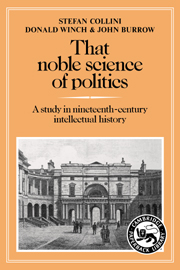Book contents
- Frontmatter
- Contents
- Preface
- PROLOGUE: The governing science: things political and the intellectual historian
- I The system of the North: Dugald Stewart and his pupils
- II Higher maxims: happiness versus wealth in Malthus and Ricardo
- III The cause of good government: Philosophic Whigs versus Philosophic Radicals
- IV The tendencies of things: John Stuart Mill and the philosophic method
- V Sense and circumstances: Bagehot and the nature of political understanding
- VI All that glitters: political science and the lessons of history
- VII The clue to the maze: the appeal of the Comparative Method
- VIII Particular polities: political economy and the historical method
- IX The ordinary experience of civilised life: Sidgwick and the method of reflective analysis
- X A separate science: polity and society in Marshall's economics
- XI A place in the syllabus: political science at Cambridge
- EPILOGUE: A nebulous province: the science of politics in the early twentieth century
- Index
II - Higher maxims: happiness versus wealth in Malthus and Ricardo
Published online by Cambridge University Press: 17 September 2009
- Frontmatter
- Contents
- Preface
- PROLOGUE: The governing science: things political and the intellectual historian
- I The system of the North: Dugald Stewart and his pupils
- II Higher maxims: happiness versus wealth in Malthus and Ricardo
- III The cause of good government: Philosophic Whigs versus Philosophic Radicals
- IV The tendencies of things: John Stuart Mill and the philosophic method
- V Sense and circumstances: Bagehot and the nature of political understanding
- VI All that glitters: political science and the lessons of history
- VII The clue to the maze: the appeal of the Comparative Method
- VIII Particular polities: political economy and the historical method
- IX The ordinary experience of civilised life: Sidgwick and the method of reflective analysis
- X A separate science: polity and society in Marshall's economics
- XI A place in the syllabus: political science at Cambridge
- EPILOGUE: A nebulous province: the science of politics in the early twentieth century
- Index
Summary
The truths of political economy form but a class among the principles of administration, and in their practical application must often be limited by higher maxims of state, to which in theory too they are held subordinate, as being less general.
francis horner, ‘Observations upon the Bounty upon Exported Corn’, Edinburgh Review (1804)Wealth, population and power are, after all, only valuable, as they tend to improve, increase, and secure the mass of human virtue and happiness.
t. r. malthus, Observations on the Effects of the Corn Laws (1814)nobody could accuse Horner, the most assiduous of Dugald Stewart's pupils, of adopting a constricted view of the map of knowledge, and the first of our epigraphs seems to indicate that in spite of the enlarged and more autonomous status granted to political economy by his teacher, he continued to adhere to the older Smithian definition of its domain, namely as ‘a branch of the science of a statesman or legislator’. When applying the principles of political economy to practice, a more general science had to adjudicate in cases of conflict between wealth and indisputably higher objectives of policy. On the occasion in question, Horner was dealing with the problem made familiar by Smith's dictum to the effect that defence was more important than opulence; and this conflict between security and abundance remained an issue in the running debate on the Corn Laws which took place during and after the Napoleonic Wars.
- Type
- Chapter
- Information
- That Noble Science of PoliticsA Study in Nineteenth-Century Intellectual History, pp. 63 - 90Publisher: Cambridge University PressPrint publication year: 1983
- 3
- Cited by



